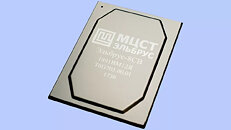T0@st
News Editor
- Joined
- Mar 7, 2023
- Messages
- 2,177 (3.19/day)
- Location
- South East, UK
Russian business news outlet Kommersant has learned from industry figures that prices of natively-designed computer processors have been on the rise since the beginning of 2023. Domestic manufacturers of PC, server and storage systems are requiring greater supplies of CPUs designed by Baikal Electronics and MCST - the publication posits that growing demand and logistical issues have become the root cause of recent climbs in cost - individuals involved in the computer hardware supply chain have suggested that some processor models have doubled in price. Sergey Ovchinnikov, the chief executive of Norsi-Trans (a server and data storage firm) provided comment: "Production of Russian chips at foreign fabs has become more complex, leading to extended logistics chains and, consequently, an increase in the cost of the final component." International trade sanctions have not prevented the arrival of fresh silicon into the region - Ovchinnikov claims that an unnamed foundry is able to supply (likely via proxy) Russian developers with computer processors.
Kommersant's investigation found out that Baikal's BE-T1000 CPU is now sold for roughly $110 (8900 Rubles) at a popular computer hardware e-tailer (ChipDip) in the region. The very basic dual core MIPS32r5 (28 nm) processor was readily available for $50 (3990 rubles) back in 2018, so its price has risen by 220% in recent times. TSMC was contracted as the manufacturer of Baikal's BE-T1000 CPU, and the Taiwanese foundry started producing these SoCs in 2016. A Baikal Electronics representative has denied any involvement in driving up MSRP, and states that it is up to distributors and retail outfits to determine prices. The company suspects that very old stock is being sold at inflated rates - Kommersant was unable to contact anyone at ChipDip for a statement.



Maxim Koposov, chief executive at Promobit, has observed that Baikal Electronics and MCST CPU prices have increased across the board, and it is difficult to compete in a market where: "more and more companies are announcing products based on Russian processors." He admits that his organization is relying on the supply of grey import x86-based CPUs (but does not specify whether these are Intel or AMD units). Koposov states that parts of his latest lineup of PCs, servers, and storage subsystems (Bitblaze) products are built on non-domestic hardware. His reasonings are simple: "No one wants to work at a loss or break even, especially given the possibility of including products based on foreign components in the register of the Ministry of Industry and Trade."
View at TechPowerUp Main Site | Source
Kommersant's investigation found out that Baikal's BE-T1000 CPU is now sold for roughly $110 (8900 Rubles) at a popular computer hardware e-tailer (ChipDip) in the region. The very basic dual core MIPS32r5 (28 nm) processor was readily available for $50 (3990 rubles) back in 2018, so its price has risen by 220% in recent times. TSMC was contracted as the manufacturer of Baikal's BE-T1000 CPU, and the Taiwanese foundry started producing these SoCs in 2016. A Baikal Electronics representative has denied any involvement in driving up MSRP, and states that it is up to distributors and retail outfits to determine prices. The company suspects that very old stock is being sold at inflated rates - Kommersant was unable to contact anyone at ChipDip for a statement.



Maxim Koposov, chief executive at Promobit, has observed that Baikal Electronics and MCST CPU prices have increased across the board, and it is difficult to compete in a market where: "more and more companies are announcing products based on Russian processors." He admits that his organization is relying on the supply of grey import x86-based CPUs (but does not specify whether these are Intel or AMD units). Koposov states that parts of his latest lineup of PCs, servers, and storage subsystems (Bitblaze) products are built on non-domestic hardware. His reasonings are simple: "No one wants to work at a loss or break even, especially given the possibility of including products based on foreign components in the register of the Ministry of Industry and Trade."
View at TechPowerUp Main Site | Source








